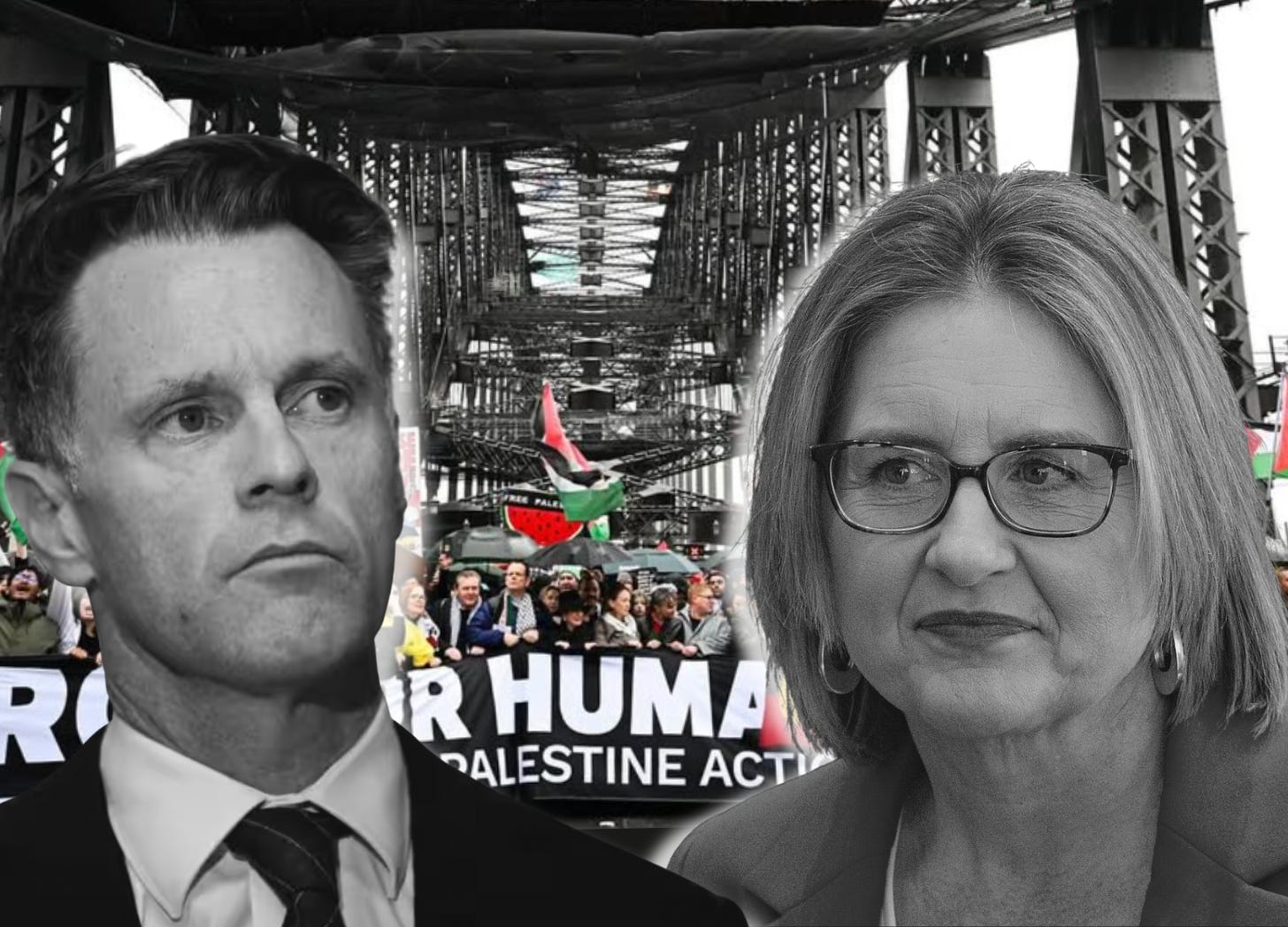Does Labor have a democracy problem?
State Labor's crackdown on protests and unwavering support for Israel raise deeper questions about the party's relationship with power and its democratic principles.
Quick note: One motivation with Deepcut is to inject some sorely needed intellectualism into our public debates. And so, some of our work will not be standard reporting, but analyses that amplify the perspectives of experts. As Amy Remeikis wrote in her first Deepcut column, it's taking a look at the bigger picture behind the daily issues, and a step back from the distracting noise of mainstream and social media. Hope you find this approach constructive, and please send us feedback at any time!
It's a question that shadows the hardline, anti-protest positions of both NSW Labor premier, Chris Minns, and Victorian Labor premier, Jacinta Allan.
Both attempted to thwart mass pro-Palestine marches last weekend. Both remain steadfast in their support for Israel, even as federal colleagues begin to criticise a state now widely accepted to be committing genocide against Palestinians in Gaza.
But according to Labor historian and ANU professor, Frank Bongiorno, "we shouldn't be too shocked or surprised" by state Labor governments clamping down on dissent.
In a lengthy interview with Deepcut, Bongiorno provides the historical context behind the current draconian positions of Labor leaders – positions that have drawn rebukes from UN officials.
A history of protest crackdowns
Minns is facing the heat, even from within his NSW Labor right faction, for his attempt to block the Sydney Harbour Bridge protest. My old Guardian colleague, Anne Davies, highlighted the risk of Minns going down in history as "the most conservative premier of the modern era".
But Minns's contempt for pro-Palestine protesters is rooted in a Labor tradition of defending the powerful against the powerless.
"There's a history of the Labor Party in government, particularly state Labor in government, but also federal governments at times, using the coercive powers of the state to suppress protest and dissent," Bongiorno says.
He cites the Chifley government's deployment of the military to break the coal strike in 1949, and the Hawke government's crackdown on labourers and airline pilots in the 1980s. Recent state Labor governments have also passed harsh anti-protest laws in response to the climate movement.
"Labor governments work with power. They negotiate power," he says. "One of the common tenets that you'll find amongst professional Labor politicians is that we're not a protest movement – we're a party that seeks to capture and to exercise power.
"It is always seeking to form alliances with one power centre, sometimes against another power centre. It also sometimes forms alliances with power centres against people without power."
Labor's pro-Israel stance
One such power centre today is the pro-Israel lobby – an alliance shaped by longstanding ties to a broader Australian Jewish community that has, according to Bongiorno, "a strongly pro-Labourist tradition".
"The NSW Labor right, historically, was very pro-Israel. That's clearly a more confused and unpredictable thing today. But Minns's positions do seem to be rather in that older tradition," he says.
"In Victoria, the Labor right seems to be very pro-Israel ... Allan is not from the right, she's from the left, as was Dan Andrews. And Andrews is very pro-Israel, very interestingly, and Allan seems to be pretty much the same.
"I imagine that there are some pretty strong relationships there that have survived everything that's happened in the last couple of years ... so that probably helps to explain some of the positions that politicians are taking up."
But is an alliance with a lobby supportive of a state committing genocide pulling Labor too far from its sense of morality and purpose?
The backlash against Minns over the Bridge protest has gone beyond angry words. Caucus members are planning a motion to endorse the right to protest. At the heart of this anger lies a deeper question:
Where does Labor stand on democracy?
"The Labor Party needs to have a discussion about democracy and it's a bit reluctant to do this," Bongiorno says.
"There's a habit in Australia of equating democracy with free and fair elections. There's a hell of a lot more to democracy than simply being able to run an election efficiently and having the defeated party accept [defeat]. You also need to protect democratic rights between elections – free speech, free assembly."
It's a discussion the party can't easily avoid. The symbolic Sydney Harbour Bridge protest – which organisers say drew 300,000 people – reveals a growing disconnect between community expectations and government priorities.
"The role of government is to run the economy. We hear that again and again," Bongiorno says. “It's a post-1970s way of thinking about what governments are for. They don't spend enough time thinking about the ways in which a free society isn't just about prosperity. It's also about those rights to assembly and speech – all those things that people in other countries have been willing to give their lives for."
Caught behind a changing society
A common critique of the hardline NSW premier is that he "appears to be more attuned to the News Corp media and talkback radio than his own party". I would argue that the entire Labor leadership – federal and state – is caught in an echo chamber of rightwing and establishment media, unable to adapt to society’s shifting needs and
expectations.
"There's a kind of broader story here about a society that's changing, about people's aspirations," Bongiorno says. "That term 'economic management' is simply no longer a satisfactory preoccupation for very significant proportions of the electorate, who recognise in that term a kind of conservatism that basically says, 'Oh, you just keep ticking along. You don't ever confront those areas of privilege in the economy, and the disadvantage of certain groups'.
He points to young people burdened by debt, without job security or access to housing as more than mere economic issues – they’re democratic failures.
"The system itself is insufficiently democratic. It's insufficiently responsive to the needs and aspirations of people who have less power. Undoubtedly, people are concluding that there's something fundamentally wrong with the way our democratic order operates."
If Labor fails to understand the present moment, the result could be "a less vibrant, a less successful, a less exemplary type of democracy".
"You can still have your elections, you can run elections efficiently, but that's a pretty tenuous idea of a democracy in my view."
In lieu of a West Asia wrap this week, I've penned something different:
I was so deeply moved by the story of young Amir, who, according to former US soldier Anthony Aguilar, was killed by Israeli troops moments after he kissed Aguilar's hand and received a small amount of food to take back to his family.
There's so many horrors coming out of Gaza and you never know which story will break you. This broke me. I had no choice but to write through the tears.
I leave you with a short reflection on Amir's death. I suggest reading this when you have a quiet moment.
Amir – will I forget your name?
I’ll never forget your story. I’ll never forget you walked miles, covered in dirt, shifting through ruin, whirring drones surveilling your every step. That your fading limbs cried for mercy as your heart thundered ahead.
I’ll never forget the details – that the just fury streaming through your blood was halted by the calmness of your smile. Show them kindness, despite their bombs eviscerating your very existence. Kiss their hands, so that they may see the innocence in a child’s eyes, and through them, a glimpse of their lost souls.
It worked. You melted the gun and touched the American’s heart. And you walked, your heart vindicated. Your limbs revived with excitement. Their pain, and those of your family, were to be eased.
But you were betrayed. A bullet pierced your flesh and your soul sought flight, leaving a shattered heart in its wake. I’ll never forget this story.
Like I’ll never forget the story of Hind. How her six-year-old body, with skin as tender as your own, was riddled with bullets as she pleaded for help. Bullets fired from the most wicked depths to which humanity can sink.
Like I’ll never forget the story of Refaat, whose decaying flesh wilted from its bones, alone, in the rubble of its ancient city, as his spirit flew through his words to reach the corners of the earth.
Like I’ll never forget the slain grandmother, and the instant drop to the floor, as she clenched her grandson’s tender fingers in the shield of her palm, and held a white flag in the other.
I’ll never forget the young woman, lying under rubble, as her widowed dove scoured for her crushed corpse above, drowning in the tears of his broken heart.
I’ll never forget the girl whose corpse was strewn as she hung on the protruding steel of an exposed wall. I’ll never forget the burning bodies, screaming in disbelief at the ferocity of evil.
I’ll never forget them, nor will I forget your name, Amir.
Or will I?
***
How many stories will disappear from our memory? How many stories do we not know? How many families have been shattered through generations past, and generations to come?
Each story is a deep wound that tears through the hearts of kin, and extends through offspring. All descendants of those who suffered such unspeakable cruelty with the intent of erasure understand this.
That’s why the fiercest voices in support of the Palestinians have been the First Nations of other settler colonies, and the Irish, and the South Africans, and the Jews untainted by Zionism.
Each story is a book on its own – not only of the violent end, but the trivial pains and joys of life that filled the years leading up to it.
How many hundreds of thousands of books will be left unwritten, unknown?






Democracy is absolutely more than just free and fair elections. This current NSW ALP has to be one of the most conservative governments we have had. Minns' stance on the Palestinian protest was ludacris and it is biting him in the arse now!
All the power to your newsletter and reporting. You have my support.
Antoun, I'm just catching up on this article while I wait for a day procedure & I'm trying to control my tears, we will never forget their lives especially the children like Hind & Amir and there so so many.